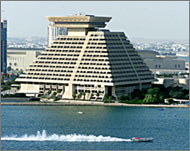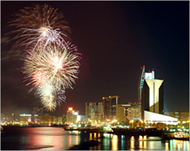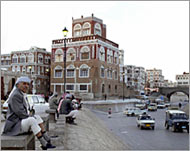Report: Arab states in need of reform
The Arab world is facing a population time bomb and urgently needs to reform governments, education systems and cultural rules that keep women out of the workforce, or the region will slip further behind a fast-moving global economy, a World Economic Forum report has said.

The Arab World Competitiveness Report 2005, released at a conference on regional economies being held in Doha, Qatar, was not uniformly negative, praising energy-rich Gulf states, especially tiny Qatar, which it ranked as the Arab world’s most competitive economy.
But the tough report said most of the 12 Arab countries, whose economic and social indicators were measured against one another, are being held back by government corruption and red tape, spiraling public debt, poor use of technology and limited participation in the global economy.
Resistance to change
Faring worst are Lebanon and Yemen, which were ranked last due to huge public debt, corruption and instability.
Perhaps most urgent were assessments of the biggest Arab countries including Egypt, Algeria and Saudi Arabia.
“It’s not that you have to run fast, you have to run quicker than the others,” said World Bank chief economist for the Middle East, Mustafa Nabil.
 |
|
Qatar was ranked as the most |
But “euphoria” from rising oil revenues is allowing governments to put reforms on hold. “There is a lot of resistance to change,” Nabil said.
The United Arab Emirates, home to tourist boomtown Dubai, was ranked a close second for its sound business climate, efficient public institutions and a fiscally prudent government largely free of corruption. Island nation Bahrain comes third.
But the world needs “large-scale economies, such as Egypt and Algeria, to be the engines of growth of the Arab world,” said Ismail Siraj al-Din, the director of Egypt’s Bibliotheca Alexandrina and report co-author.
Lagging behind
Arab leaders lured there by the Geneva-based forum say the document is the clearest-yet indicator of the region’s woes, laying out a distinct reform agenda for traditionally slow-moving Arab societies.
 |
|
The United Arab Emirates was |
“The real issue is who dares act?” said Dubai’s Muhammad Ali al-Abbar, the Gulf’s largest real estate developer. “Sometimes they understand the problem but they’re not capable of making the changes.”
“The Arab world … seems to be lagging behind in terms of technology and human capital,” said Augusto Lopez-Claros, chief economist of the forum’s global competitiveness programme, who singled out rising unemployment, lack of technological development and substandard universities as key Arab world concerns.
Qatar’s economic minister, Shaikh Muhammad Bin Ahmad Bin Jasim Al Thani, said it was easier to push reforms in small Gulf countries such as his where business-friendly economic policies are in place.
Demographic time bomb
While Arab countries vary significantly in per-capita income levels and political and economic liberalisation efforts, economists say all countries must boost job creation and income levels to improve national competitiveness.
Based on current Arab world employment levels, countries need to create 80 million jobs over at least the next decade to satisfy the growing pool of jobseekers.
“This statistic highlights the potential for social and political instability in coming years,” Lopez-Claros told the gathering’s opening session. “There is no time to lose.”
|
“Unless Lebanon can turn its public finances around, it will probably remain near the bottom of these rankings” Augusto Lopez-Claros, chief economist of the World Economic Forum global competitiveness programme |
Jordan’s deputy prime minister, Marwan Muashir, referred to a demographic “time bomb” and said population growth would push Jordan’s 13% jobless rate to 24% in a decade if something was not done.
“It’s one of Jordan’s biggest problems. It’s truly a time bomb,” Muashir said.
The spread of violent religious extremism, particularly in the Gulf, has been linked to a lack of employment and democratic freedoms. Participants also fingered the US-led invasion of Iraq and America’s acquiescence to Israel’s occupation of Palestinian and Syrian land as key sources of instability.
More investment
Speakers said they were hewing to reforms under way for years and not responding to pressure from US President George Bush, who wants democratic change in the Middle East.
World Bank economist Nabil said the region’s main obstacle was “government structures don’t allow forces for change to emerge”.
 |
|
Yemen (above) and Lebanon |
Citing an example of the problems confronting Arab economies, Nabil said investments were not being channeled into the necessary sectors.
After the 11 September 2001 attacks, many wealthy Arab investors shied away from investing in the US. Instead of directing the money to promote local job creation, they invested in regional real estate, sparking a property boom that some fear could collapse.
Arab world GDP has increased from 3.7% in the 1990s to 5.6% in 2003 and 2004, but Nabil predicted GDP levels would drop below 5% this year and in 2006.
Lebanon, Yemen bottom
The report ranked last Lebanon and Yemen, which suffer from security problems, high debt, government corruption, low national savings rates, poor credit ratings and high inflation.
“Unless Lebanon can turn its public finances around, it will probably remain near the bottom of these rankings,” Lopez-Claros said.
In Yemen, the report found the region’s worst corruption and a business community feeling “extremely pessimistic” about economic prospects.
Conspicuously absent from the rankings were Iraq, Kuwait, Syria and Libya, not included because of difficulties in gathering data or reliable figures.
Qatar has a per-capita income of nearly $34,000 a year – the Arab world’s highest – and surveyors found one of the world’s highest national savings rates, a healthy government budget surplus, and a business community optimistic about its economic prospects. Its economy grew a rocketing 20% last year, leading most of the world.
Qatar, sitting atop the world’s largest field of natural gas, gets its only black marks from government favouritism towards certain local firms connected to the government, a low level of innovative capacity, probably due to low spending on research and development and low enrolment rates for higher education.
Coming fourth was Oman, followed by Jordan, Tunisia, Saudi Arabia, Morocco, Egypt and Algeria.